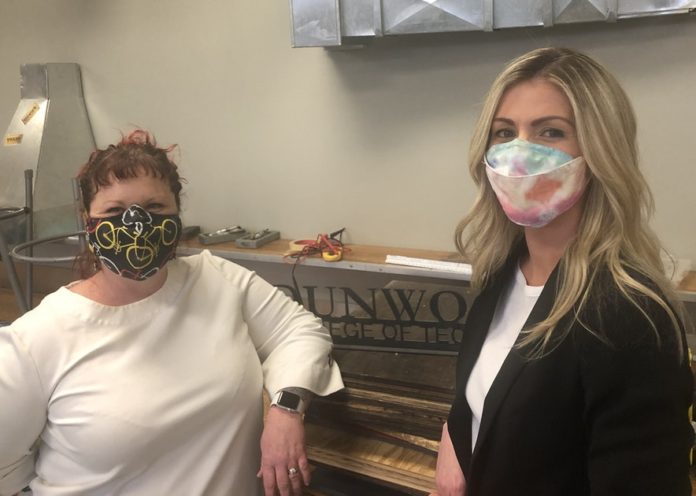
Claire Ferrara, president of Standard Heating & Air Conditioning, is proof that Dunwoody College of Technology is not your grandfather’s trade school.
And Ferrara, 34, a Dunwoody graduate like her father, from whom she acquired majority ownership of Standard in 2019, also embodies the continued slow opening of the predominantly white-male building trades.
Ferrara is a third-generation owner of the Minneapolis-based company, started by her grandfather in 1930. She succeeded her dad, Ted, 63, who bought out his father in 1977.
“I had to prove that I had the technical knowledge, trade school, the street ‘cred’ and knew as much the guys,” said Ferrara, who studied HVAC technology at Dunwoody and also graduated from St. Catherine University in St. Paul.
Ferrara, who remembers going to the office on Saturdays as a kid to clean and file, worked several years in construction and building management for other companies before joining Standard in 2016 as a sales representative.
Her leadership skills were tested last year by the effects of the COVID-19 pandemic and recession. Last April, amid order cancellations, she believed business could be off by up to 50% for the entire year.
Ferrara borrowed more than $1 million through a Paycheck Protection Program forgivable loan to help make April-May payroll at the 100-employee company. She also laid off a few people. But a mass layoff was averted and, fairly quickly, the company recalled workers as business picked up. By summer, a new trend was clear: Consumers decided to invest in their homes since they couldn’t take vacations.
By the end of the year, revenue and employment had actually grown at Standard.
“The employee feedback I got is that the employees were glad a woman was in charge,” Ferrara said. “They felt I was communicative and empathetic. More vulnerable. That’s not a weakness. It was a strength. It was how I got 100 people going in the direction we needed to go. I needed to help people feel safe in the time of pandemic.”
Ferrara sensed there was much pressure on wives, usually primary caretakers of children, and often workers outside the home. She wanted employees to know she supported their mental health as well as economic needs.
“We tried to work with every single employee who had a need with day care; adjusted work shifts, work-from-home, additional time off, and tried to meet them where they were at,” Ferrara said.
Ferrara also long has known she labored in a male-dominated industry. She is grateful for the men with whom she has worked who wouldn’t tolerate harassment or disrespect and saw her as they would their sister or daughter: deserving of a hassle-free workplace.
Heather Gay, who leads Dunwoody’s construction management and civil engineering technology programs, is a college-trained construction manager who entered the industry as a teenager.
“The first job site I was on, the advice I heard from a [supervisor] was ‘Have a thick skin,’ ” she recalled.
Gay and Ferrara, who remains involved with Dunwoody as adviser and scholarship fundraiser, said the school increasingly stresses soft skills that help workers of different genders, race and background establish common ground and respectful boundaries at school and work.
The money is good in the trades, often $30 to $60-plus an hour for plumbers, electricians and carpenters.
“We also have to provide the other things to support a diverse workforce,” said Ferrara, citing predicting job shortages as workers, predominantly white males in their 50s and 60s, age out.
According to Dunwoody and state figures, the number of women working in construction in Minnesota is 19%, nearly double the national average. And the five-year trends show progress in developing a workforce that reflects the growing diversity of the Twin Cities.
Overall, in the fall of 2015, women constituted 14% and students of color 18% of the 1,094-member Dunwoody student body. By the fall of 2020, women were 18% and minorities were 19% of the 1,281 students.
In 2015 in the construction sciences and building technology curriculum, 16% of the 317 students were women and 16% were people of color. Last fall, women were 23% and students of color 22%.
Dunwoody tuition and fees can top $22,000 a year. It also provides need-based scholarships. The school also has completed a $40 million overhaul of its campus southwest of downtown. Dunwoody has added four-year degrees in mechanical and software engineering, as well as electrical engineering. It also is among the few private colleges in the state that has seen enrollment grow in recent years.
Women and people of color won’t soon dominate the construction trades. But it’s good to see the numbers rising, skills and craft spreading to more people. As the economy recovers from the recession, Minnesota will need everyone striving to be as good as we can be.
Neal St. Anthony has been a Star Tribune business columnist and reporter since 1984. He can be contacted at nstanthony@startribune.com.








